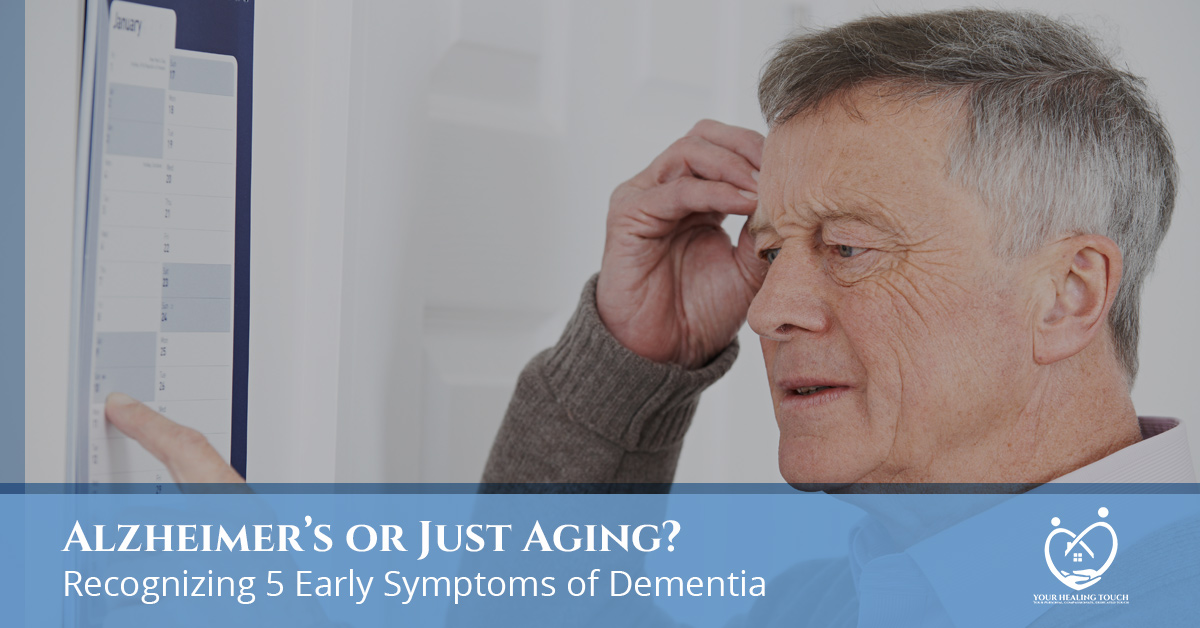
Alzheimer’s disease (AD) currently affects nearly six million people across America, most of them above the age of 65. This poses a unique challenge for anyone watching for the onset of AD, since many of its earliest symptoms are just exaggerated versions of what naturally occurs as the body ages. So if you or your loved one is forgetting to turn the oven off more often these days, how can you tell if it’s due to natural age-related changes in memory, or if it’s a possible early sign of dementia?
The Alzheimer’s Association has identified ten of the earliest symptoms of Alzheimer’s. Today, our dementia care experts at Your Healing Touch will be taking a look at the first five symptoms to discuss when a change is likely due to natural aging — and when it might justify contacting your doctor.
It’s normal to grow a little more forgetful as you get older. Occasionally forgetting important names, dates, or appointments and remembering them later is a typical age-related change.
However, if you or your loved one must ask repeatedly for the same information over and over, continually forget recently-learned information, or increasingly need to rely on memory aides like notes or electronic reminders, you may want to contact your primary care physician. These changes in memory are often the first symptom of early-stage Alzheimer’s.
Everyone — no matter their age — occasionally makes silly mistakes during tasks, finds it hard to focus, or has trouble following through on plans. Making mistakes every now and then is part of being human, and as we age, having difficulty planning or solving problems gets more common. If you’re worried that you’ve been having a little more trouble than usual balancing your checkbook, you are likely just experiencing natural age-related loss of focus.
However, if you find yourself having difficulty following a familiar recipe, are overwhelmed by keeping track of your monthly bills, take significantly longer to do menial tasks, or cannot seem to concentrate on anything, you may be experiencing the earliest symptoms of AD.
An additional age-related change associated with loss of focus may include needing more help with simple but technical tasks like altering the settings on your kitchen appliances or changing the clocks during daylight savings time. Having a bit more trouble with these in your elder years is a normal change and should not be cause for concern.
However, if you find it increasingly difficult to complete simple daily tasks like taking a familiar drive, managing your budget at work, or remembering the rules of your favorite sport or game, you may want to discuss these changes with your primary care physician.
Everyone occasionally has to ask, “What day is it again?” Losing track of the day of the week and quickly figuring it out is normal, no matter how old you are. As you age, you may find it happening more often, but this could be due to a changing schedule more than a changing memory. It’s harder to keep track of the days once you’re out of the workforce.
However, if you find yourself forgetting the month, or standing in rooms forgetting how you got there, why you’re there, or even where you are, you may be experiencing an early symptom of AD and we advise you to contact your doctor.
Eyeballs age with the rest of the body, and it’s normal for your eyesight to get worse as you get older. If your prescription is changing or your vision is getting cloudier, you are advised to speak with your optometrist about treating natural age-related changes in vision.
However, for some people, having vision problems is an early indication of dementia. If you’re facing increasing difficulty reading, determining color, or judging distance, and the problem cannot be corrected by your eye doctor, you should speak with your primary care physician.

Thinking about the onset of Alzheimer’s can be difficult, but early detection is important. If you or a loved one are experiencing any of the above five symptoms, you should speak with your doctor — and you should also know that there is opportunity for rich, fulfilling life even after a dementia diagnosis.
At Your Healing Touch, we are passionate about providing compassionate in-home senior care, including specialized Alzheimer’s care, to people of all independence levels. Our Indiana-based team of qualified care aides can offer trained medical assistance, support with daily tasks, and companionship to help patients achieve the best possible quality of life in the comfort and familiarity of their own home.
If you are in Indiana and would like to learn more about our professional elder care services, please contact us today. We’re ready to help.